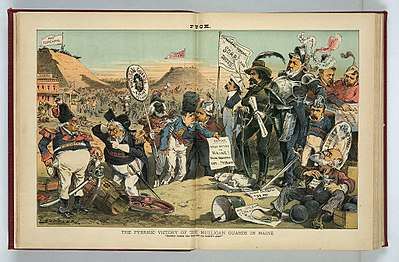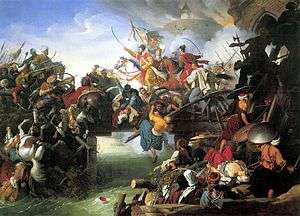Pyrrhic victory

A Pyrrhic victory (/ˈpɪrɪk/ (![]()
Etymology
Pyrrhic victory is named after King Pyrrhus of Epirus, whose army suffered irreplaceable casualties in defeating the Romans at the Battle of Heraclea in 280 BC and the Battle of Asculum in 279 BC, during the Pyrrhic War. After the latter battle, Plutarch relates in a report by Dionysius:
The armies separated; and, it is said, Pyrrhus replied to one that gave him joy of his victory that one other such victory would utterly undo him. For he had lost a great part of the forces he brought with him, and almost all his particular friends and principal commanders; there were no others there to make recruits, and he found the confederates in Italy backward. On the other hand, as from a fountain continually flowing out of the city, the Roman camp was quickly and plentifully filled up with fresh men, not at all abating in courage for the loss they sustained, but even from their very anger gaining new force and resolution to go on with the war.
In both Epirote victories, the Romans suffered greater casualties but they had a much larger pool of replacements, so the casualties had less impact on the Roman war effort than the losses of King Pyrrhus.
The report is often quoted as
Ne ego si iterum eodem modo uicero, sine ullo milite Epirum reuertar.
Another such victory and I come back to Epirus alone.
or
If we are victorious in one more battle with the Romans, we shall be utterly ruined.
— Plutarch[3]
Examples
Battles
This list comprises examples of battles that ended in a Pyrrhic victory. It is not intended to be complete but to illustrate the concept.

.jpg)

- Battle of Asculum (279 BC),[3] Pyrrhus of Epirus and Italian allies against the Romans: the Romans, though suffering twice as many casualties, could easily replenish their ranks. Pyrrhus lost most of his commanders and a great part of the forces he had brought to Italy, and he withdrew to Sicily.
- Battle of Avarayr (451)[4][5] Vartan Mamikonian and Christian Armenian rebels against the Sassanid Empire: the Persians were victorious but the battle proved to be a strategic victory for Armenians, as Avarayr paved the way to the Nvarsak Treaty (484 AD), which assured Armenian autonomy and religious freedom.
- Siege of Szigetvár (1566),[6][7] Ottoman–Habsburg wars: although the Ottoman Turks won the siege, it can be seen as a Pyrrhic victory because of the heavy Turkish casualties, the death of Sultan Suleiman, and the battle delayed the Ottoman push for Vienna that year, thereby suspending Ottoman expansion in Europe.
- Battle of Malplaquet (1709),[8][9][10] War of the Spanish Succession: the battle was an Allied victory because Marlborough's army kept possession of the battlefield, but it had suffered double the French casualties and could not pursue. The French army withdrew in good order and relatively intact, and it remained a potent threat to further Allied operations.
- Battle of Bunker Hill (1775),[11][12] American Revolutionary War: after mounting three assaults on the colonial forces, the British won control of the Boston peninsula in the early stages of the war, but the engagement cost them many more casualties than the Americans had incurred (including a large number of officers) and led them to adopt more cautious methods, which helped American rebel forces; the political repercussions increased colonial support for independence.
- Battle of Guilford Court House (1781),[13][14] American Revolutionary War: in this short battle, the British force defeated a superior American army; the British lost a considerable number of men and their drive to conquer the southern colonies changed course.
- Battle of Chancellorsville (1863),[15] American Civil War: General Robert E. Lee split his army in the face of Hooker's larger Union force; the audacious strategy allowed the Confederate army to win the day against a numerically superior foe. However, 20% of Lee's army was injured or killed, including General Stonewall Jackson, and his losses were difficult to replace. Lee's weakened army went on the offensive, but less than two months later was defeated and forced to retreat after the Battle of Gettysburg.
- Battle of the Santa Cruz Islands (1942),[16][17][18] World War II, Solomon Islands Campaign: Japanese and Allied naval forces met during the struggle for Guadalcanal and nearby islands. After an exchange of carrier air attacks, U.S. surface ships retreated with one carrier sunk and another severely damaged. The Japanese carrier forces achieved a tactical victory, as none of their ships were sunk, but the heavy loss of irreplaceable veteran aircrews was to the strategic advantage of the Allies.
- Battle of Chosin Reservoir (1950),[19][20] Korean War: the Chinese army attempted to encircle and destroy the UN forces but in a 17-day battle in freezing weather, the UN forces inflicted crippling losses on the Chinese while making a fighting withdrawal. The Chinese occupied northeast Korea but they did not recover until the spring, and the UN maintained a foothold in Korea.
- Battle of Vukovar (1991),[21][22] Croatian War of Independence: the Yugoslav People's Army (JNA) laid siege to the city of Vukovar, held by the Croatian National Guard and civilian volunteers. After 87 days, the ruined city fell to the JNA. The siege exhausted the JNA and was a watershed in the Croatian War.
Other uses
The term is used as an analogy in business, politics and sport to describe struggles that end up ruining the victor. Theologian Reinhold Niebuhr commented on the necessity of coercion in preserving the course of justice by warning,
Moral reason must learn how to make coercion its ally without running the risk of a Pyrrhic victory in which the ally exploits and negates the triumph.
— Karl Paul Reinhold Niebuhr[23]
In Beauharnais v. Illinois, a 1952 U.S. Supreme Court decision involving a charge proscribing group libel, Associate Justice Black alluded to Pyrrhus in his dissent,
If minority groups hail this holding as their victory, they might consider the possible relevancy of this ancient remark: "Another such victory and I am undone".
— Hugo Black[24]
Related terms
A related expression is "winning a battle but losing the war". This describes a poor strategy that wins a lesser objective but overlooks and loses the larger objective.
A "hollow victory" or "empty victory" is one in which the victor gains little or nothing.[25] Examples include:
- In a murder trial, where a guilty verdict brings justice for the victim but the family is still bereft.[26][27]
- A court-martial clears an officer of blame in a military accident but the death and damage cannot be undone.[28]
- A civil case is decided in favor of the plaintiff but the awarded amount of money or property is less than he spent to bring the lawsuit.[29]
- Victory in a battle or war which, by winning, caused additional problems in the future.[30][31]
- A campaign that did not achieve its goals despite the claim of victory.[32]
See also
| Look up Pyrrhic victory in Wiktionary, the free dictionary. |
References
- ↑ Plutarch (trans. John Dryden) Pyrrhus, hosted on The Internet Classics Archive
- ↑ Historiarum Adversum Paganos Libri, IV, 1.15.
- 1 2 Plutarch. "The Life of Pyrrhus". Parallel Lives. IX (1920 ed.). Loeb Classical Library. p. 21.8. Retrieved January 26, 2017.
- ↑ Hewsen, Robert H. (August 17, 2011). "AVARAYR". Encyclopædia Iranica.
So spirited was the Armenian defense, however, that the Persians suffered enormous losses as well. Their victory was pyrrhic and the king, faced with troubles elsewhere, was forced, at least for the time being, to allow the Armenians to worship as they chose.
- ↑ Susan Paul Pattie (1997). Faith in History: Armenians Rebuilding Community. Smithsonian Institution Press. p. 40. ISBN 1560986298.
The Armenian defeat in the Battle of Avarayr in 451 proved a pyrrhic victory for the Persians. Though the Armenians lost their commander, Vartan Mamikonian, and most of their soldiers, Persian losses were proportionately heavy, and Armenia was allowed to remain Christian.
- ↑ Kohn, George C., ed. (2006). Dictionary of Wars (Third ed.). Infobase Publishing. p. 47. ISBN 978-0-8160-6577-6.
- ↑ Lázár, István; Tezla, Albert (1999). An Illustrated History of Hungary (6th ed.). Budapest: Corvina Books. p. 70. ISBN 978-963-13-4887-3.
- ↑ Lynn, John A. (1999). The Wars of Louis XIV: 1667–1714. London: Longman. p. 334. ISBN 0-582-05629-2.
Marlborough's triumph proved to be a Pyrrhic victory
- ↑ Delbrück, Hans (1985). History of the Art of War, Volume IV: The Dawn of Modern Warfare. Translated by Renfroe, Walter J. Eastport, Conn.: Praeger. p. 370. ISBN 0-8032-6586-7.
Malplaquet was what has been termed with the age-old expression a "Pyrrhic victory”...
- ↑ In a letter to Louis XIV, the French general Villars wrote: "Si Dieu nous fait la grâce de perdre encore une pareille bataille, Votre Majesté peut compter que tous ses ennemis seront détruits." ["If God gives us the grace of losing such a battle again, Your Majesty may expect that all his enemies will be destroyed."]; Anquetil, Louis-Pierre, Histoire de France depuis les Gaulois jusqu'à la mort de Louis XVI (1819), Paris: Chez Janet et Cotelle, p. 241.
- ↑ Clinton, Henry (1954). Willcox, William B., ed. The American Rebellion: Sir Henry Clinton's Narrative of His Campaigns, 1775–1782. Yale University Press. OCLC 1305132.
A few more such victories would have shortly put an end to British dominion in America.
- ↑ "Battle of Bunker Hill". Encyclopædia Britannica. Encyclopædia Britannica, Inc. December 8, 2016. Retrieved January 25, 2016.
Although the British eventually won the battle, it was a Pyrrhic victory that lent considerable encouragement to the revolutionary cause.
- ↑ British Whig Party leader and war critic Charles James Fox said, "Another such victory would ruin the British Army!". Baker, Thomas E. Another Such Victory, Eastern Acorn Press, 1981, ISBN 0-915992-06-X.
- ↑ McGrath, Nick. "Battle of Guilford Courthouse". George Washington’s Mount Vernon: Digital Encyclopedia. Mount Vernon Ladies’ Association. Retrieved January 26, 2017.
In three hours, Cornwallis's army took possession of the field, but it was a Pyrrhic victory... Cornwallis could not afford the casualties his army sustained, and withdrew to Wilmington. By doing so, Cornwallis ceded control of the countryside to the Continentals.
- ↑ Evan Andrews (1 September 2015). "5 Famous Pyrrhic Victories". History. A&E Television Networks, LLC. Retrieved 17 July 2016.
- ↑ Levine, Alan J. (1995). The Pacific War: Japan Versus the Allies. Westport, Connecticut: Praeger. p. 104. ISBN 0-275-95102-2. Retrieved January 26, 2017.
This battle of the Santa Cruz Islands was clearly a Japanese victory; the sole Japanese victory in a carrier battle during the war. But it was a Pyrrhic victory, which the Japanese were in no condition to exploit. The damage to their carriers was serious, and their plane losses very heavy. Moreover, the land-based air force at Rabaul was exhausted; many of its best pilots were dead. In late October, the Japanese air effort fell off steeply. Because of its heavy losses and inadequate pilot training program, the Japanese naval air force had already slipped into a qualitative decline from which it never recovered.
- ↑ Pike, Francis (2015). "Guadalcanal: Henderson Field and the Santa Cruz Islands (September 1942 - January 1943)". Hirohito's War: The Pacific War, 1941-1945. London: Bloomsbury Publishing Plc. p. 509. ISBN 978-1-4725-9670-3. Retrieved January 26, 2017.
Vice-Admiral Nagumo, who was transferred to shore duty after the battle, reported to the Combined Fleet with greater than usual insight and honesty, "This battle was a tactical win, but a shattering strategic loss for Japan. Considering the great superiority of our enemy's industrial capacity, we must win every battle overwhelmingly to win this war. This last one, although a victory, unfortunately, was not an overwhelming victory." Naval victories are usually counted in ships lost but given the destruction of the cream of the Japanese Navy’s aircrews, it could even be argued that, in the case of the Battle of the Santa Cruz Islands, the Japanese came off worst. Reporting several weeks after the battle, Nimitz too correctly calibrated the result of the battle: "This battle cost us the lives of many gallant men, many planes and two ships that could ill be spared... We nevertheless turned back the Japanese again in their offensive to regain Guadalcanal and shattered their carrier air strength on the eve on the critical days of mid-November. It was indeed a pyrrhic victory."
- ↑ Toll, Ian W. (2015). The Conquering Tide: War in the Pacific Islands, 1942-1944. Pacific War Trilogy. II. W. W. Norton & Company. ISBN 978-0393080643. Retrieved January 26, 2017.
As at Coral Sea, the contest would go into the books as a tactical victory for the Japanese but a strategic victory for the Americans... The Japanese press reported another triumph, and the rank and file cheered another fantastic victory. But the senior commanders of the navy privately acknowledged that the result had been, at best, a pyrrhic victory.
- ↑ Xue, Yan (徐焰) (1990), 第一次较量:抗美援朝战争的历史回顾与反思 [First Confrontation: Reviews and Reflections on the History of War to Resist America and Aid Korea] (in Chinese), Beijing: Chinese Radio and Television Publishing House, p. 59, ISBN 978-7-5043-0542-8
- ↑ Roe, Patrick C. (2000), The Dragon Strikes: China and the Korean War, June-December 1950, Novato, California: Presidio, p. 412, ISBN 978-0-89141-703-3
- ↑ Woodward, Susan L. (1995). Balkan Tragedy: Chaos and Dissolution after the Cold War. Washington, D.C.: Brookings Institution Press. p. 258. ISBN 978-0-8157-9513-1.
- ↑ Central Intelligence Agency Office of Russian and European Analysis (2000). Balkan Battlegrounds: A Military History of the Yugoslav Conflict, 1990–1995: Volume 1. Washington, D.C.: Central Intelligence Agency. p. 99. ISBN 978-0-16-066472-4.
- ↑ Niebuhr, Reinhold Moral Man and Immoral Society, published by Scribner, 1932 and 1960, reprinted by Westminster John Knox Press, 2002, ISBN 0-664-22474-1, ISBN 978-0-664-22474-5 p. 238.
- ↑ Beauharnais v. Illinois, 343 250 (U.S. 1952).
- ↑ "Idiom: Hollow victory". UsingEnglish.com. UsingEnglish.com. Retrieved January 26, 2017.
A hollow victory is where someone wins something in name, but are seen not to have gained anything by winning.
- ↑ Shapiro, Emily (January 10, 2017). "Charleston Victim's Brother Calls Dylann Roof's Sentence a 'Hollow Victory'". abcNEWS.go.com. ABC News Internet Ventures. Retrieved January 26, 2017.
The brother of one of convicted Charleston church shooter Dylann Roof's nine victims calls the 22-year-old's death sentence a "hollow victory". Melvin Graham, brother of victim Cynthia Hurd, said after Roof's sentence was read this afternoon, "Today we had justice for my sister." But he called Roof's sentence a "very hollow victory because my sister's still gone."
- ↑ Gartrell, Nate (January 25, 2017). "Oakley woman found guilty of involuntary manslaughter in boyfriend's death". East Bay Times. Martinez, California: Digital First Media. Retrieved January 26, 2017.
Shellie Farnham, 47, was convicted Wednesday of involuntary manslaughter and dependent endangerment causing the death of Rodney Lee Moss, 43…. Moss’s mother, Pam Bellanca, said hearing the jury’s verdict was a relief. “It’s always a hollow victory, because we can’t bring Rodney back,” prosecutor Jill Henderson said. “All we can do is seek justice.”
- ↑ Adams, Scarritt (Captain, U.S.N.) (February 1960). "The Cask of Rum That Drowned a Thousand Men". The Skipper. Annapolis, Maryland, USA: The Skipper Publishing Company. p. 32. Retrieved January 26, 2017.
Yet the ensuing court-martial found the captain not guilty - a hollow victory with his son at the bottom of Portsmouth Harbor.
- ↑ Byrne, Ciar (24 October 2002). "Grobbelaar's hollow victory earns him just £1 in damages". The Guardian. Guardian News and Media Limited. Retrieved 26 January 2017.
Ex-football star Bruce Grobbelaar today won his appeal, but failed to restore his damaged reputation, when the House of Lords ordered the Sun newspaper to pay him just £1 in libel damages for accusing him of match-fixing... "By recovering the sum of only £1, he has effectively lost his action to clear his name and may face legal costs of over £1m."
- ↑ Dodd, Gwilym (October 2015). "Agincourt: Henry's Hollow Victory". History Today. History Today Ltd. 65 (10).
Agincourt was a hollow victory because it engendered unrealistic expectations and, in particular, it blinded Henry and his advisers to the strategic impossibility that England could ever subdue its neighbour across the Channel…. The victory at Agincourt gave Henry the initiative, but in the end he became a prisoner of his own ambitions and in the process of trying to realise them he subjected both England and France to one of the most intensive periods of fighting seen in the war.
- ↑ Nolan, Cathal J. (2002). "Crimean War". The Greenwood Encyclopedia of International Relations, Volume 1, A - E. Westport, Connecticut: Greenwood Publishing. p. 373. ISBN 0-313-30741-5. Retrieved January 26, 2017.
The impact on Britain of its hollow victory was rather less: it recommenced its military complacency, blithely unaware of what was quietly happening in Prussia (military reform and moderization) while frittering away resources on a futile and distant war.
- ↑ Carpenter, Ted Galen, ed. (2000). NATO's Empty Victory: A Postmortem on the Balkan War. Washington, D.C.: Cato Institute. p. frontispiece. ISBN 1-882577-85-X.
The United States and other NATO members loudly proclaim that the alliance achieved a great victory in the war against Yugoslavia. According to the conventional wisdom, NATO waged a successful campaign to prevent genocide; enhanced its credibility as an effective institution for preserving peace, stability, and justice in post-Cold War Europe; and intimidated would-be aggressors around the world. Such claims already ring hollow.